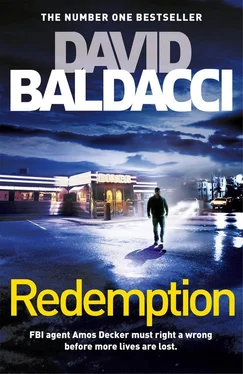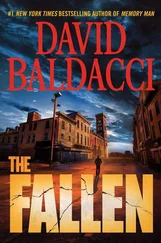Jenny was sitting across from Decker. “You said you think someone hired a person to kill Rachel?”
Decker nodded and focused on her, as her father sat up straighter in his chair. “That’s right.”
“But why would anyone do that? Rachel has never hurt anyone.”
“You know her well?”
“I would consider us friends. She’s actually taught me a lot about handling myself. I’ve started to work with Dad, and she’s been in the business world for a long time. I consider her a mentor.”
“And you’ve been doing a good job too,” said Marks proudly.
Decker’s surprise must have shown on his face, because Jenny smiled sardonically and said, “I’ve grown a little since you last knew me, Detective Decker. Even earned my MBA.”
“Glad to hear it, Ms. Marks.”
“Oh, just make it Jenny. You saved me from that low-life jerk over two years ago. You deserve a first-name relationship.”
“Okay, Jenny. When was the last time you talked to Katz?”
“Oh, probably about a week or so ago. We had lunch, just a catch-up sort of thing.”
“She seem okay?”
“Yes, nothing out of the ordinary.”
Marks said, “What do you think is going on, Decker?”
“I’m not sure. Someone wanted her dead. And her husband was murdered too.”
“But that was a long time ago. And they caught the guy who did it.”
“No, we didn’t. A man was convicted, but he didn’t kill David Katz and the others. He ended up coming back to town and being murdered too.”
Marks said, “Wait a minute, that’s right. I remember hearing about that. What was his name again?”
“Meryl Hawkins.”
“That’s right. It was all over the news. Those murders all those years ago cast a long shadow on this town, I can tell you that. And now you say he’s innocent?”
Decker noticed that Jenny Marks had flinched at her father’s remark. “What is it?” he asked her.
“Just something that Rachel said.”
“When?”
“The last time I talked to her. We were discussing business and that’s when she said it.”
“What?”
“It was really weird.” She paused to recall it. “Something about sins and long shadows .”
“ Old sins cast long shadows?” said Lancaster, who had been raptly listening to this exchange.
Jenny pointed at her. “Yes, exactly. Old sins cast long shadows.”
Lancaster said, “Sounds like something out of a British detective novel.”
Decker caught Mars’s eye. He said, “Shades of truth.”
“What?” asked Marks.
“Just something else that Rachel told someone. Do you know anything else about David Katz’s background?”
“Well, I had him checked out when we were talking about doing some deals together. They never came to fruition because he was killed. Everything seemed to check out okay.”
“How far back did your check go?”
“Um, I’m not sure. George?” He looked at the man on the right of Lancaster. He was small and slightly built, with thinning dark hair and a bony face.
George said, “We usually do a financial dig on the person. Go back about five years. I didn’t do the one on this Mr. Katz, but that’s generally the drill.”
“Five years,” said Decker, really to himself.
“Do you think that’s far enough?” asked Marks.
“Apparently not,” replied Decker.
It was seven A.M. and Decker sat on his bed at the Residence Inn, once more going over the construction plans for the American Grill. He had sent off texts to Jamison asking her for help on a variety of questions. He hadn’t gotten responses yet on those, or the research he had asked her to do about the shell companies backing Rachel Katz’s projects. He didn’t know if he ever would.
He was slowly turning the pages of the construction drawings when he stopped and peered more closely at a particular page. Then he flipped back a few pages and studied the information there. Next, he grabbed another handful of documents and went down the list of line items. Finally, he picked up his phone and made a call.
Lancaster answered. “I’m just about to step into the shower, Decker, can I call you back? And I had too much to drink last night. My head is splitting.”
“It’s actually Earl I want to talk to.”
“Hang on.”
A few moments later Earl’s voice came on the line. “What’s up, Amos?”
“Got another construction question for you.”
“Okay. Shoot.”
“I’m looking at the construction plans for the American Grill and invoices for construction materials.”
“All right.”
“You know the size of the place, right?”
“Generally. It’s a typical footprint for a retail restaurant operation.”
“Talk some more about that.”
“Well, I mean a four-exterior-wall, one-story basic rectangle. Cinderblock construction with brick veneer and a flat tarred and pebble-topped roof where the outside HVAC units are housed.”
“What sort of square footage are we talking?”
“For a sit-down restaurant as opposed to a fast-food place, about sixty percent of the space goes to the dining and bar area and forty percent to the kitchen, prep areas, and storage. The Grill, I would estimate, is about five thousand square feet, so about three thousand of that would be the dining and bar and the rest for kitchen, prep, and storage. Then you have your enclosed Dumpster area out back. The interior layout allows about fifteen square feet of space per patron seat. That’s the general rule of thumb in the industry. That way, the Grill could comfortably accommodate a couple hundred diners at a time. Which I think is around its fire code limit of customers at any one time.”
“Okay, how much concrete are we talking about for a place that size?”
“You’d pour your footers. That’s not all that much. Then you’d lay your block walls.” He gave Decker an estimate of the concrete, and the blocks required.
Decker looked at the line item on the page he was looking at. “The cinderblock count is pretty much spot on. But what if I told you the concrete outlay was way over quadruple what you just said?”
“That’s impossible.”
“Tell me a way that it wouldn’t be impossible.”
Earl was silent for a few moments. “Well, the only way to justify that much concrete is if they built a full basement, so their pour obviously would be a lot more. But why would a restaurant want a full basement instead of just footers and foundation you build on? You couldn’t possibly need that much storage.”
“Good question,” said Decker. “Hope I find the answer.”
He thanked Earl, told him to have his wife call back when she was done, clicked off, and looked down at the plans.
The American Grill was turning out to be far more special than he had previously thought.
A full basement for what?
And maybe whatever that was would explain why David Katz had built it, and why Rachel Katz had kept it all these years.
He went on his laptop and loaded in the name William Peyton and added the qualifier “the American Grill.” Nothing remotely relevant came up in connection with the longtime manager of the restaurant.
He took out his phone and pulled up the photos he’d taken of the trainees including the one named Daniel. The trainees who never stayed very long. Then his memories shifted to the guy who’d been staring at him from the kitchen. There clearly had been suspicion in that look.
He glanced back at the construction plans and then focused on Earl Lancaster’s words:
The only way to justify that much concrete is if they built a full basement.
But as he’d also pointed out, why would David Katz have gone to the additional time, trouble, and expense for more storage area than he could possibly ever need? And if there was an underground room, it would have to be accessible somehow. There would have to be a door down there. And steps. And what would be down there?
Читать дальше












